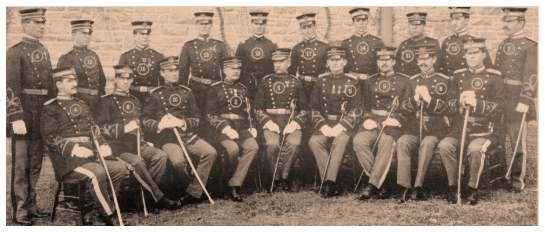Inside the Fair's gate, the St. Louis City Police had no jurisdiction across
St. Louis County line. A county grand jury and a sheriff helped form
the Jefferson Guard that would end the "lawlessness and debauchery" in the bars and gambling dives which had sprung up there.
The Jefferson Guards were not simple volunteers, but veterans of the
Spanish-American and Philippine-American wars. They lived in barracks on the fairgrounds and were paid 50 dollars a month (later, they received a 10 dollar a month raise).
Their job entailed guarding the exhibits, escorting distinguished visitors, enforce Fair's rules as well as being trained to assist the fire department.
They could arrest people but had no power to charge them for their crimes.
The Jefferson Guards was considered by many to be helpful ("walking information booths"), but also on occasion- heavy-handed.
A local newspaper's August 3, 1904 issue poked fun at the Jefferson Guards in a story- "Police at the Fair Will Get You If You Don't Watch Out." and detailed causes for which visitors could be arrested: walking on the grass; carrying lighted cigars into exhibits (remember, the buildings were constructed of wood and staff) and "jollying" (making fun) of the guards.
John Mason of 2224 Edwards Street complained to the Post-Dispatch after being arrested by a Jefferson Guard for not wearing a coat in the Palace of Fine Arts. After a brief delay, he was let go when Captain William Young, commander of the World's Fair District, didn't know what to charge him with.
But all was not bad, the police and Jefferson Guards kept an eye out for lost children and delivered a total of 1,160 wandering kids to The Model playground, where parents knew anyone lost would be taken. The Guards could also call for ambulances or medical help for the sick. There was no charge for ambulatory services.
To protect Queen Victoria's jubilee treasures displayed in the British Pavilion, Scotland Yard agents were brought over, headed by Sir John Kenneth Ferrier, who also demonstrated a new police technique,- fingerprinting, to a June meeting of the International Association of Police Chiefs.
By the summer months, 1,000 Jefferson Guard were used on a daily basis.
